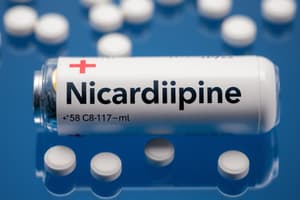Podcast
Questions and Answers
What class does Nicardipine belong to?
What class does Nicardipine belong to?
- Antianginal
- Antihypertensive
- Coronary vasodilator
- All of the above (correct)
What is Nicardipine indicated for?
What is Nicardipine indicated for?
- Management of hypertension
- Angina pectoris
- Vasospastic angina
- All of the above (correct)
What is the mechanism of action for Nicardipine?
What is the mechanism of action for Nicardipine?
Inhibits the transport of calcium into myocardial and vascular smooth muscle cells.
What is the preparation for Nicardipine?
What is the preparation for Nicardipine?
What is the dose range for Nicardipine?
What is the dose range for Nicardipine?
What are the hemodynamic effects of Nicardipine?
What are the hemodynamic effects of Nicardipine?
How is Nicardipine metabolized?
How is Nicardipine metabolized?
What are the side effects of Nicardipine?
What are the side effects of Nicardipine?
What are some nursing considerations for Nicardipine?
What are some nursing considerations for Nicardipine?
Flashcards are hidden until you start studying
Study Notes
Nicardipine Overview
- Class: Antianginal, antihypertensive, and coronary vasodilator.
Indications
- Used for managing hypertension, angina pectoris, and vasospastic angina.
Mechanism of Action
- Inhibits calcium transport into myocardial and vascular smooth muscle cells, leading to reduced excitation-contraction coupling.
Preparation Forms
- Available in:
- Single Concentration: 20mg/200ml D5W
- Double Concentration: 40mg/200ml D5W
- Maximum Concentration: 125mg/250ml D5W
Dosage Range
- Administered at 2.5-15mg/hr, with titration possible every 15 minutes.
- Initial drip recommended at 6mg/hr, which can be increased by 2.5mg/hr up to a maximum of 15mg/hr.
Hemodynamic Effects
- Causes systemic vasodilation, resulting in lowered blood pressure.
Metabolism and Pharmacokinetics
- Primarily metabolized by the liver; less than 10% excreted unchanged via kidneys.
- Onset time: minutes; Peak effect: 45 minutes; Duration: 5 hours; Half-life: 2-4 hours.
Side Effects
- Central Nervous System: Dizziness, headache.
- Cardiovascular: Hypotension.
Nursing Considerations
- Monitor patients for hypotension.
- Commonly used as a first-line treatment for post-operative hypertension, especially following CABG with LIMA, due to its role in preventing arterial spasms.
- Similar effects to nitroglycerin (NTG) when using LIMA.
- Prolonged therapy may elevate hepatic enzymes, which typically normalize after discontinuation.
- Normal concentrations can be infused via peripheral IV if no central line is available.
Studying That Suits You
Use AI to generate personalized quizzes and flashcards to suit your learning preferences.


